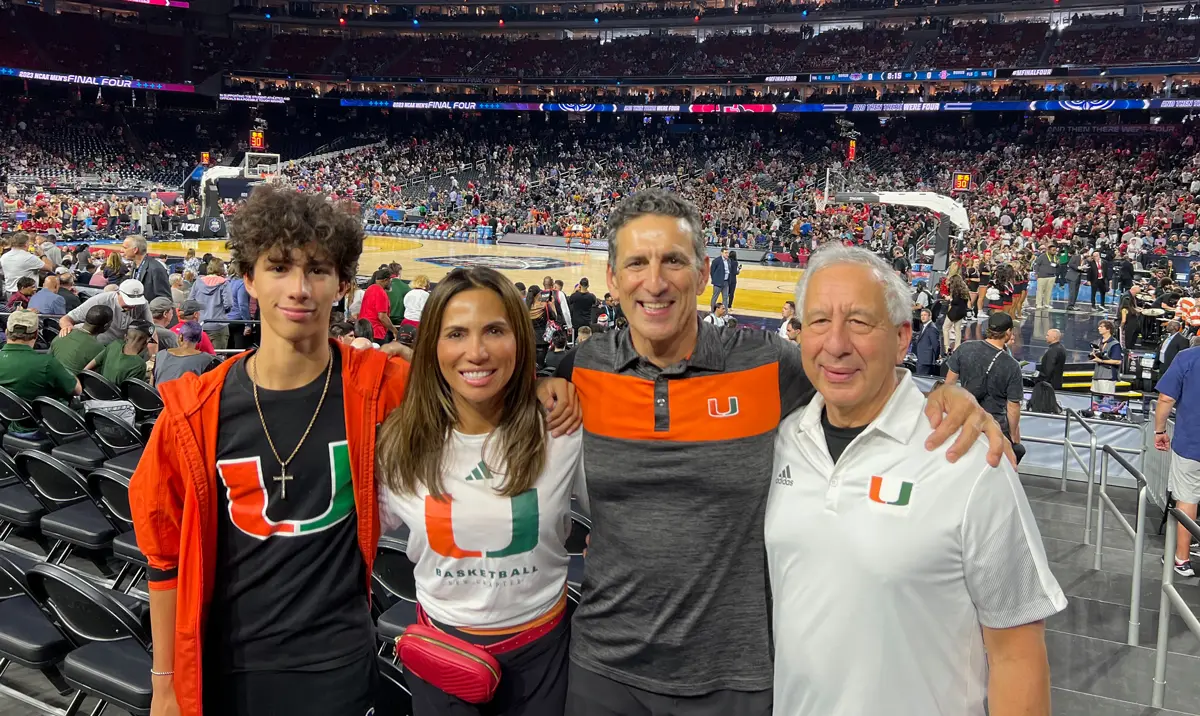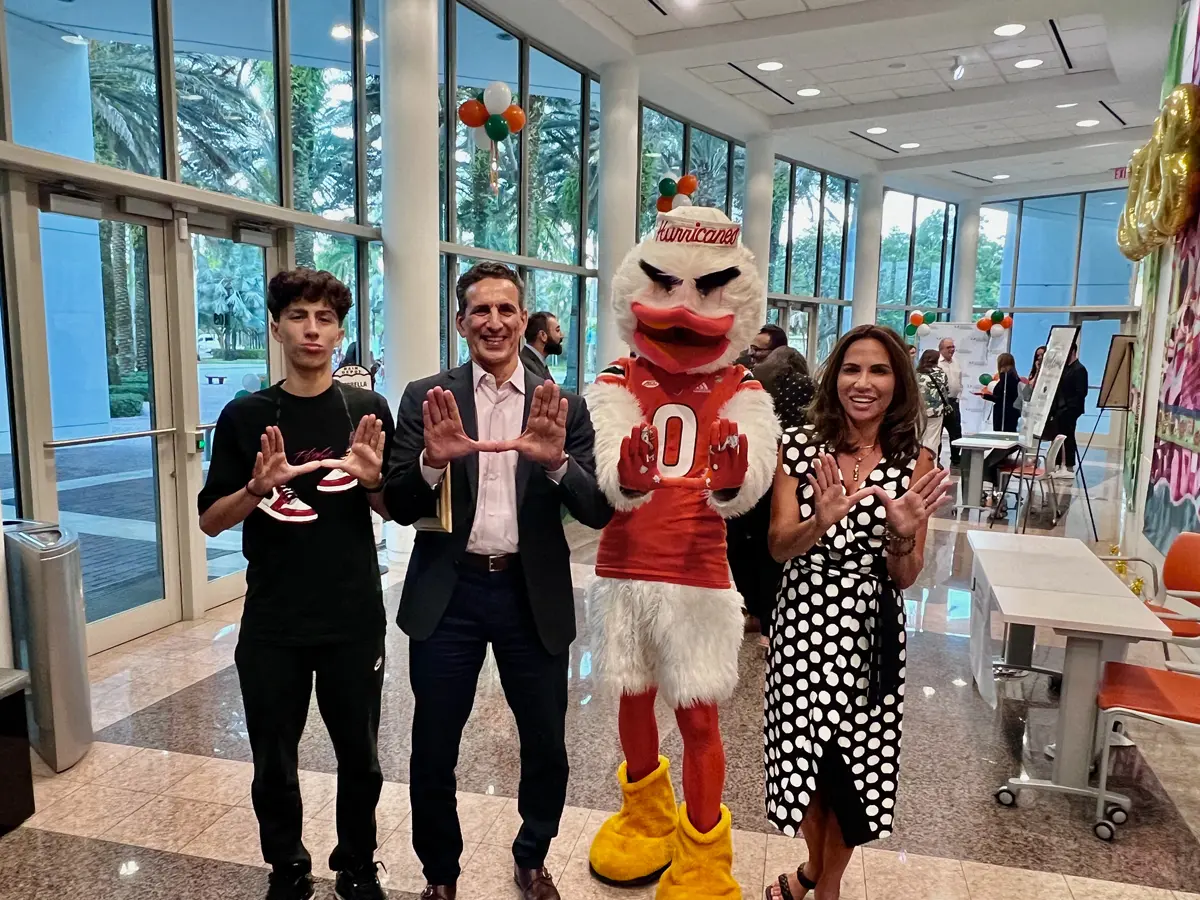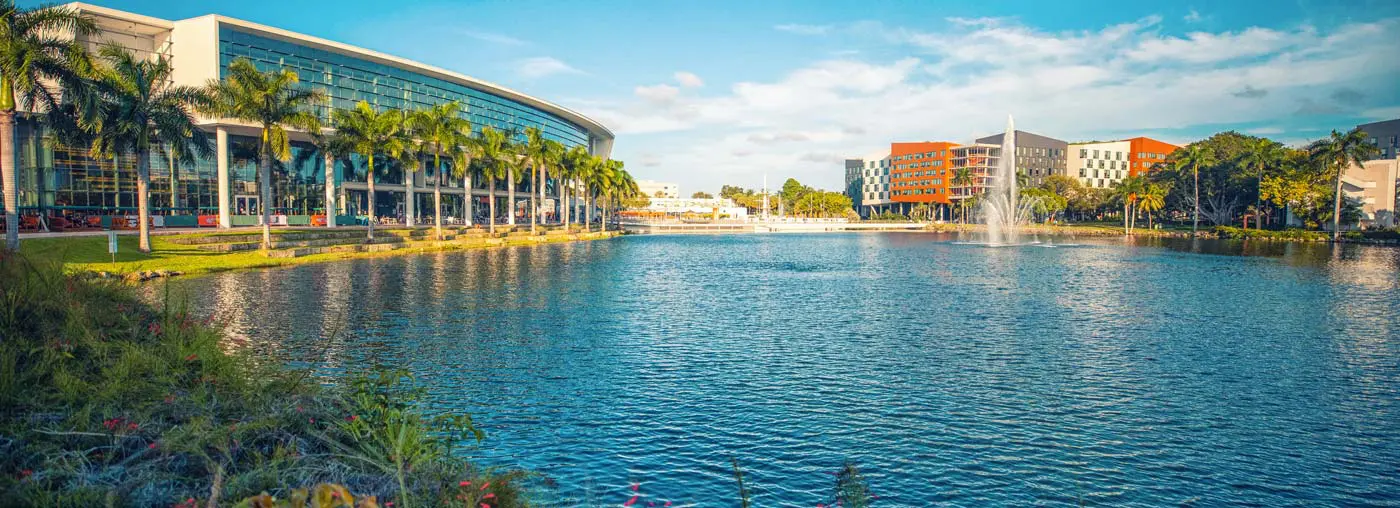Dr. Stephen Cerrone
By Christy Cabrera Chirinos
It was a conversation, a moment, and a kindness she doesn’t think she will ever forget.
As part of a discussion in one of her classes in the Miami Herbert Business School, Maria Mastrando, along with Holliday Prichard, shared with their classmates and professor some of the experiences they’d had and people they’d met as members of Miami’s rowing team.

They detailed their competition and practice schedules. Talked about the real-life examples of leadership they’d seen from Shirelle Jackson, Miami’s Executive Associate Athletic Director for Student-Athlete Development and rowing’s sport administrator. And before long, they shared how their program was hoping to raise funds by offering supporters the opportunity to name the Hurricanes’ boats.
“For me to be able to talk about that in class, I was so familiar and so excited,” said Mastrando, a junior from Ocean City, New Jersey. “It’s not often you get to share with a classroom of 30-plus people how much dedication your team has and what you’ve been working towards. Holly and I were both kind of stunned.”
But that was far from the only surprise Mastrando would get in Dr. Stephen Cerrone’s class.
Not long after those first-day conversations, Cerrone – a longtime supporter of Hurricanes athletics and associate professor in the Herbert Business School – informed Mastrando and Pritchard that he intended to help in the rowing team’s efforts.
Now, every time Mastrando sees the newly named Black Panther boat, she can’t help but smile and feel gratitude for the belief her professor showed in her and her teammates.
“It’s very rare that you get to meet someone that’s helping your program in such a substantial way and not even in how the program is funded, but in your day-to-day practice,” Mastrando said. “You’re going to be using that equipment. You touch that boat. You are representing that name and your school and it’s such an honor to sit inside something that was gifted to you because of how someone else believed in your abilities and your team’s strength and determination.”
Mastrando and her teammates are just a few of the countless Hurricanes student-athletes that have been impacted by Cerrone’s generosity over the years.
And she’s far from the only Hurricane who has had the opportunity to take one of the professor’s classes at Miami.
Among those former students? Head coach Mario Cristobal, who took one of Cerrone’s management classes during his time as an offensive lineman at Miami, a fact both the coach and the professor reminisced about on the Greentree Practice Field after Cristobal returned to lead his alma mater’s program three years ago.
“It was a human resources class, the management of people,” Cerrone recalled with a chuckle. “It’s fascinating. The class I was teaching him in was how to recruit, how do you engage, how do you motivate, how do you compensate, how do you manage performance and set goals, how do you build the right culture. It’s all the stuff he’s doing now. And after [Miami], he went on his own journey and earned his way to where he is today.”
For Cerrone, teaching has always felt like a calling.
He first answered that call not long after moving to South Florida to work as a corporate human resources manager for Burger King. At the same time, the University was seeking out adjunct professors for its management department.
And so, Cerrone, who’d served as a teaching fellow while completing his master’s and doctorate degrees at the University of Houston, began teaching at Miami.
He continued that work for nearly five years before moving to London as Burger King’s Vice President for Human Resources. When the company brought him back to South Florida in 1999 as its Executive Vice President for Worldwide Human Resources, Cerrone once again returned to the University as an adjunct professor.
Despite his busy schedule, being in the classroom remained a priority.
“The one thing I realized was that the classroom was a wonderful environment where, in a very short period of time, you could have a significant impact on someone’s life,” Cerrone said. “If I compare that to corporate, I could be the head of HR for a company like Burger King, work with an executive, and they would make a small adjustment to their behavior. [But] I can be in a classroom for three months with 35 undergrads and move them a mile.
“The ability the classroom provides you, if you do a good job, to impact someone’s life in a meaningful way … to get them to think hard about what they value, what they want, how they’re going to get there, what the hurdles are, how they’re going to measure their success … to think about that in your early 20’s is unparalleled. There is nothing like it. … I’ve done big jobs for 300,000-person organizations, but there’s no comparison in terms of the impact. No comparison.”
Eventually, though, Cerrone left the University when his career moved him to Chicago.
He spent time there with major corporations including JP Morgan/Bank One, Sara Lee, and SunEdison. He helped handle mergers, acquisitions, and bankruptcies. And he did consulting work with the likes of Hewlett Packard, KKR, Tough Mudder and Hudson’s Bay.
But after 16 years in Chicago, he and his family began weighing a potential return to South Florida.
A phone call helped move that along.
Dr. Linda Neider, who’d chaired the Management Department at Miami Herbert Business School when Cerrone first served as an adjunct professor at Miami, reached out and posed a question.
Would Cerrone be interested in stepping away from his corporate career to become a full-time professor at Miami?
The timing was less than ideal, given that it was March 2020, and the world was thrust into chaos and uncertainty because of the COVID-19 pandemic. But Cerrone and his family decided to move back to Florida and he happily rejoined the Miami faculty.
Through all the moves and changes in his career, however, there was always one constant: Cerrone’s love of sports.
A self-described “crazy sports person,” Cerrone has been to five Super Bowls, two World Cups, two Olympics, tennis Grand Slams, multiple College Football Playoff games and the Men’s Final Four.

That love, of course, came with him back to Miami, where he has been an avid supporter of Hurricanes athletics, and the student-athletes that have sat in his classroom.
“The amount of work that goes into being a student-athlete is remarkable,” Cerrone said. “People see them and think, ‘Oh, it’s great. You guys are going to school for free and you get this and this and this.’ But it’s remarkably difficult. I think one thing that teaching athletes has done for me is given me an appreciation of the amount of work that goes into just being on a team. … The training, the discipline and the rigor they have to go through. And when you see them succeed, it’s incredibly satisfying.”
But Cerrone’s support of Miami athletics isn’t limited to just the donations he’s made to various programs or the work he’s done with student-athletes in the classroom.
The professor serves as a liaison between the athletic department and faculty at the University as part of the UM Athletics Committee. And he recently worked with Matt Smale, Miami’s Executive Associate Athletics Director of Business Operations to create the UStrive Leadership Program, a nine-month development program for members of the athletic department.
“Individuals like Stephen, and Stephen specifically, willing to take time, effort, energy and set that aside for our department and our student-athletes and invest in them is a critical ingredient in our success and our future success,” Smale said of Cerrone’s impact on Miami’s athletic department as a whole.
Cerrone says that time, effort and energy he’s invested at Miami and for the Hurricanes will continue.
The Associate Professor, who has been lauded with multiple teaching awards by his students, has found a home in Coral Gables and within the University community, one that he loves.
And he’s hopeful there will be more moments like the one he recently shared with Mastrando and Prichard, among other Hurricanes student-athletes.
“Miami is a place where you can really make a difference,” Cerrone said. “I feel like both in the classroom, with athletes and agnostic of athletes, I feel like I can really make a difference. And there’s a certain vibrancy and energy that Miami has that I don’t think any other place has. You can go to Calle Ocho and sit at a little bakery and get a cafecito or a cortadito and feel like you’re in another world. That authentic, genuine characteristic is really unusual. It’s a very unique environment and I am grateful to play a small part in what all of us do at the University each and every day.”

